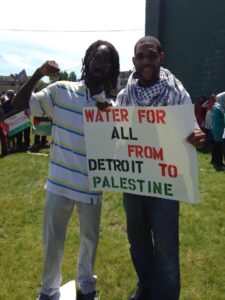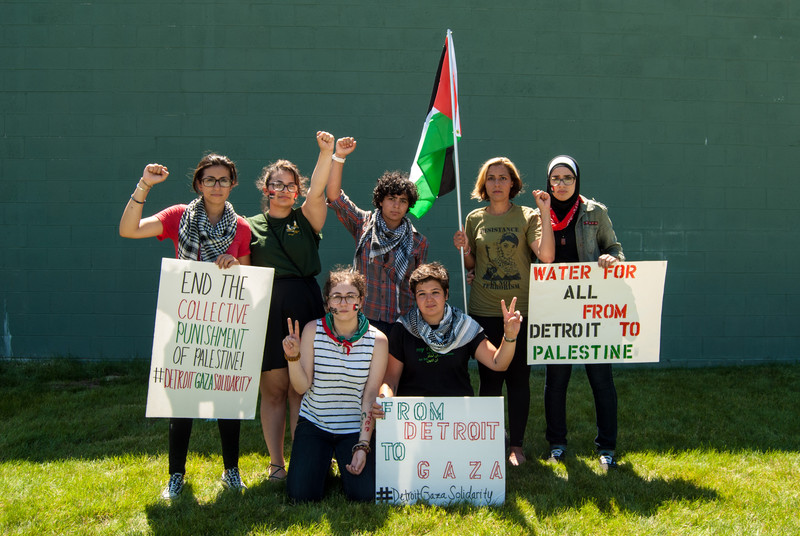Embedded within each of the three goals of the Palestinian call for Boycott, Divestment, and Sanctions (BDS)–the right of return for refugees, full legal equality within Israel, and an end to occupation and colonization of Palestinian land—is an appeal to end racist and colonial policies against Palestinians. When utilized by solidarity formations in the United States, BDS presents great potential for anti-racist organizing against both Israeli and US policies. Similar to Israel, the United States is an active and ongoing settler-colonial project that relies on racial hierarchies to exist. And so principled organizing in support of Palestinians must also confront racism and colonialism in the US. Many campus and community campaigns already operate from this joint framework, but this political framework can be developed further across a broader swath of US-based solidarity activism, as the examples below illustrate.
Ten years after the founding of the BDS movement, we find ourselves at a critical juncture for the direction of both Palestine solidarity organizing and anti-racist organizing in the US. Divestment resolutions have found overwhelming support on college campuses and church groups at the same time that states across the country legislate against BDS. We have also seen corporations attempt to minimize the liability that comes with operating in occupied Palestinian territory. Veolia sold off its Israeli operations in April 2015, and SodaStream moved outside the West Bank in September 2015 (albeit to expropriated Bedouin land in the Naqab Desert in Israel).
G4S, the global prison corporation, has perhaps been the biggest target for joint struggle between various anti-racist causes. Since the call for BDS was made, pro-Palestinian activists around the world targeted G4S for its services to Israeli colonies, checkpoints, the Wall, and prisons. The company also operates youth prisons in the US and UK; migrant detention and deportation services in the US, UK, and Australia; and private prisons in South Africa. Angela Davis, one of the world’s most outspoken critics of G4S, notes in her most recent book that G4S is the largest private employer on the African continent and has received numerous complaints for discriminatory and abusive treatment of its Black workers.
For these reasons, numerous campaigns have targeted G4S both for its operations in Occupied Palestine and in the United States. Students from the Columbia Prison Divest campaign successfully pressured Columbia University to divest from the Corrections Corporation of America and G4S in June 2015, citing the latter’s actions both in the US and in Palestine. Just two months later, a thousand Black activists, artists, scholars and students presented G4S as a target for global joint struggle in the Black4Palestine solidarity statement. “We reject notions of ‘security’ that make any of our groups unsafe and insist no one is free until all of us are,” the statement read.
In March 2016, G4S announced that it expects to terminate G4S Israel in the next 12-24 months. This announcement was heralded as a victory for the BDS movement. G4S announced at the same time that it expects to close its youth prison operations in the US and UK. While most media overshadowed this equally important announcement, the BDS Movement noted the youth prison announcement and pledged to continue to support campaigns against G4S. “From the US to Palestine, from South Africa to the UK, G4S is deeply involved in racist mass incarceration business,” the statement read, “we remain determined to work closely with partners to hold G4S to account for its participation in human rights abuses.”
This commitment to ongoing broader work even once the movement has scored its targeted ‘win’ provides a model for principled BDS organizing in the US. The response to Veolia ending its Israeli operations offers an example of work that could be continued. As the world’s largest privatizer of water and North America’s largest privatizer of transportation, Veolia raises prices for services at the local level in many working-class and minority communities. The company is implicated in two of the country’s largest water crises. One, Veolia was hired to evaluate Detroit’s water system in a nod towards privatization as the city used austerity measures to shut off water to low-income households. Two, Flint, Michigan paid Veolia $40,000 in 2015 to evaluate its water system more than a year after it switched from Detroit’s clean water system to Flint River water as an austerity measure—a switch which led to widespread lead poisoning because of corrosive contaminants in the Flint River. Despite months of citizens reporting health problems due to this switch, Veolia’s report mentioned only cosmetic issues with the city’s water–nothing about the potential for lead poisoning or Legionnaire’s Disease, which has killed 9 people in the city so far. So while BDS activism against Veolia has been largely successful, BDS activists in the US have an obligation to continue campaigning against the company for targeting largely working class, minority cities and their water systems.
Broadly speaking, organizing for the liberation of oppressed peoples within the US will create the best conditions for Palestinians to achieve their own liberation. I will share a few thoughts about where these interconnections can be developed as the BDS movement grows.
To start, one direction for joint struggle is moving beyond a focus on private prisons to mass support for the abolition of prisons entirely and liberation of our political prisoners in the process. Successfully realizing these goals would also provide concrete support for abolishing the occupation of Palestine and freeing the political prisoners held by Israel. Campaigns currently centered on supporting local Black activists in prison abolition work while connecting to national political prisoner liberation efforts could also make international connections to the issue of incarceration in Palestine and thereby build power at all levels. It is important to note that abolition has been the central and guiding political demand and need of the Black struggle from its founding moment and is the inherent impetus behind calls to end the Israeli occupation, lift the siege, end apartheid, and welcome Palestinian refugees home. Abolition cannot be considered an idealistic or unrealistic goal; it is a necessary and achievable act.
So one of our current tasks is to expose three things: 1) the entire justice system is predicated on racial and colonial violence; 2) all prisons are violent, exploitative, and illegitimate- not just private ones; and 3) all prisoners are political prisoners in the context of a structural race and class war against poor and working class Black, brown, and Native communities. We should consider the necessity of abolishing and creating alternatives to police, an institution which emerged both out of night watches and patrols for runaway slaves and as a colonial “defense” against indigenous people fighting to reclaim their land. The Ferguson uprising and connections made to Palestine also foreground the ways in which police are still occupying entities that inflict violence on working class Black, brown, and Native communities and enforce a capitalist, colonial, and racist order globally. Hence, just as we challenge the illegitimacy of the Israeli military court that tried, convicted, and incarcerated Palestinian activist Rasmea Odeh, we also have to challenge the US-based federal agencies and “justice” systems involved in her current case. The FBI, Department of Homeland Security, and the U.S. District Court are also illegitimate, as colonial institutions on stolen land that use race to target Black, brown, and Native communities. We have to work with some of these institutions temporarily, but anti-racist work also requires working towards something beyond them.
Another potential development is about the right of return locally and globally. One of the best ways to ensure return is possible for Palestinians is to reverse the process of colonization of indigenous land and cycles of displacement for working class, Black, and brown people in our own colonized territory. For example, real estate companies such as Thor Real Estate that use predatory practices to displace Black people in Detroit are headquartered in places like San Francisco or New York. Groups in these cities might build trans-local campaigns with Detroiters and other homeowners who have been physically displaced, making connections to cycles of displacement and gentrification in the US and building on campaigns that target AirBNB for its operations in Israeli settlements.
More research is needed on corporations that actively exploit indigenous land, resources, and lives in North America–notably in the mining, fracking, or resource management industries. As Steven Salaita notes in this Periscope issue, pro-Palestine organizers can and should see what sort of support local indigenous groups want in their struggles.
One final note for movement activists is that racial justice work necessarily involves economic justice work, illustrated most clearly by the South African case. The (white) capitalist structure of apartheid remained after the transition of political power to the African National Congress and Nelson Mandela. Today, South Africa’s Black neoliberal class leeches resources out of a state where the poverty is higher today than it was pre-independence. Political power without economic power means nothing even in the context of anti-racist politics. If anyone is to truly be free from apartheid, neoliberalism and capitalism must be challenged in struggles in Palestine, South Africa, and the United States. Maintaining a commitment to anti-racist and anti-colonial politics means maintaining pressure until everyone is free. The call for BDS empowers civil societies around the world to pursue campaigns that best fit their local political contexts. And so it is fully within the realm of this call to use BDS as a stepping stone in the fight for both Palestinian self-determination and local freedom.



